HCPSC prioritizes comprehensive pediatric care, encompassing prevention, diagnosis, treatment, immunizations for children of all ages. Quality healthcare is assured from infancy to adolescence.
HCPSC Pediatrics Department
Pediatric services at HCPSC aim to promote the health and well-being of young patients by addressing their unique physical, emotional, and developmental needs.
These services encompass a wide range of medical care, including preventive care, diagnosis, treatment, and management of various conditions that affect children.
Our pediatric care professionals also ensure that children receive the recommended vaccines according to the immunization schedule.
At HCPSC, quality healthcare is provided to children of all ages, including newborns, infants, growing-age children, and adolescents.
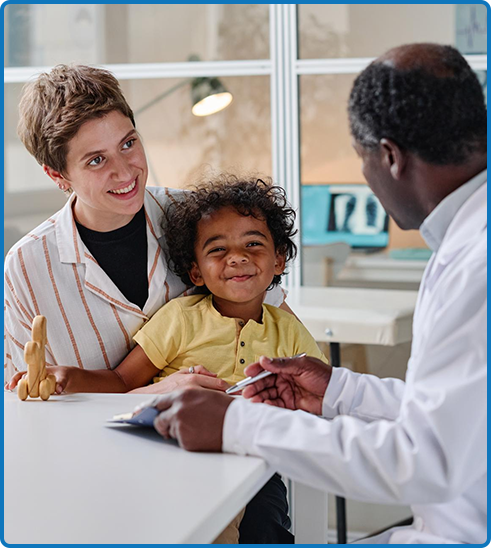
HCPSC Pediatrics Services
Here is an overview of some of the additional pediatric care offered at HCPSC, in addition to developmental, hearing and vision screenings, annual exams, and sports physicals.
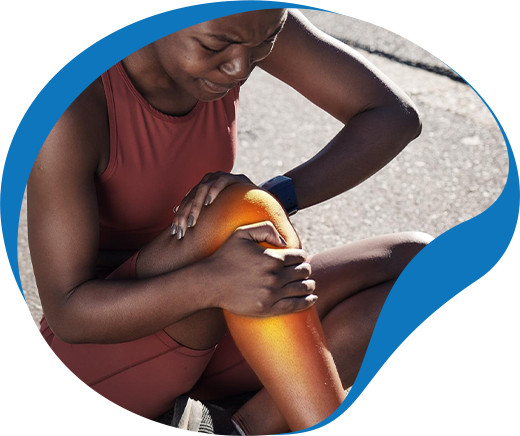
Treatment of Minor Injuries
Children develop rapidly and can sometimes find themselves in harm’s way. They may easily sustain injuries in child care or at home. Minor skin abrasions, cuts, scalds and burns happen everyday are easily treated.
Bone and joint wounds are also common in children from getting fingers caught in doors or drawers, as well as dislocation of elbows or shoulders when playing. Impact bruises from knocks, head injuries from falls, and eye injuries.
Treatment of Acute Illnesses in Children
Acute medical conditions like urinary tract infections, bronchitis, flu, ear infections, and skin infection are quite common in children of all ages. At HCPSC, there is a pediatric care provider for every type of acute illness. You can also get access to lab or in-office rapid tests for illnesses that are difficult to diagnose, such as strep throat.
It is crucial to understand the significance of diagnosing an acute disease in children accurately. All children are susceptible to infections and illnesses, and if not diagnosed and treated promptly, these conditions can escalate into severe complications.
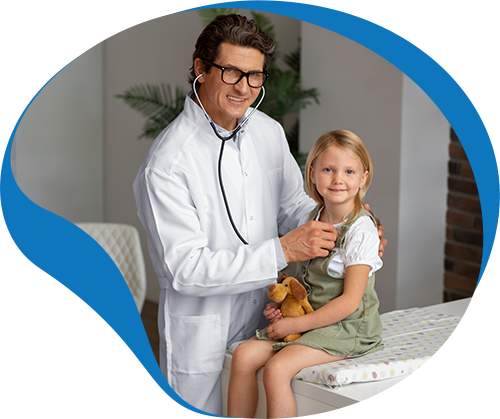
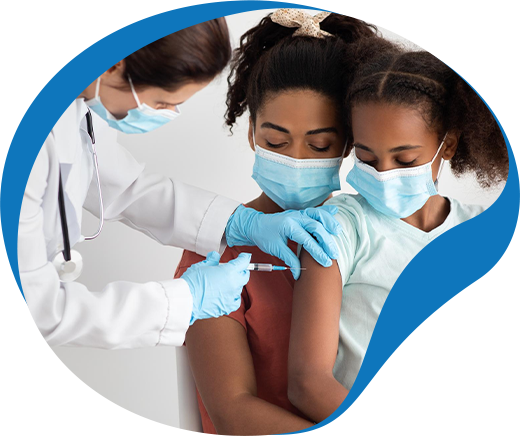
Immunization and Vaccination of Newborns, Infants, and Children
HCPSC offers routine immunizations for newborns and growing children. However, before visiting the clinic, you should be aware of all the recommended vaccinations for infants as well as children, which is available online at the CDC website.
It is also recommended to get in touch with a pediatric care provider at HCPSC if your child has missed any of these shots, or they are suffering from a medical condition that may increase their risk of getting an infection. In such cases, the healthcare professionals recommend getting additional shots that your child may need.
Behavioral Health Services for Children
As the number of children experiencing behavioral health issues continues to grow, especially after the pandemic, HCPSC has prioritized this important area of healthcare. At HCPSC, pediatric patients receive quality care and treatment for many behavioral health issues like anxiety and depression.
It’s also important to diagnose the cause of certain emotional issues in kids. After COVID-19, most children have not been able to adapt to the new routine. As a result, they may experience depression and anxiety, which must be diagnosed and treated on time.
If you think your child is showing warning signs of depression, stress, or anxiety, you may need guidance.
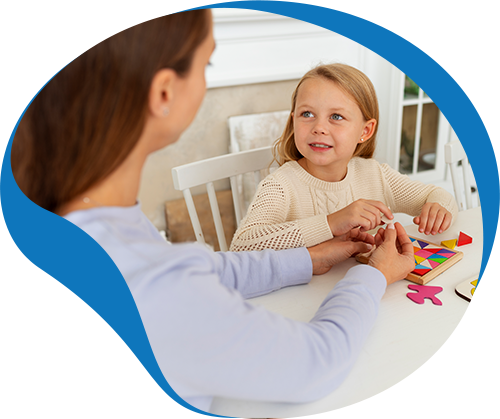
Get matched with one of our licensed and experienced behavioral health providers by calling 843-510-5113Or get in touch with us by visiting
Pediatrics & COVID-19
In children, the transmission of COVID-19 has been observed to be largely asymptomatic.
This means children may experience no symptoms at all when they’re infected with the coronavirus.
Because of this reason, researchers and medical professionals are still trying to establish the epidemiology of COVID-19 in the pediatric population.
According to the CDC, most children only experience fever and cough when they have symptomatic COVID-19, along with sore throat, headache, and fatigue in some cases.However, children with multisystem inflammatory syndrome (MIS-C), which develops after they contract the virus in rare cases, may exhibit inflammation in different parts of the body, including the heart, kidneys, brain, eyes, and skin.MIS-C is rare, but it’s still a possibility. It is crucial for parents and healthcare providers to be familiar with the arning signs and potential complications of MIS-C to ensure prompt diagnosis and treatment.
Symptoms of COVID-19 in Children
Nearly all the symptoms that adults experience after contracing the coronavirus may also appear in children. However, it is encouraging to know that most children only exhibit mild symptoms.
Recent studies have also revealed that as much as half of children who get infected with COVID-19 do not show any symptoms at all [5].
Nevertheless, some of the signs that may appear in children include;
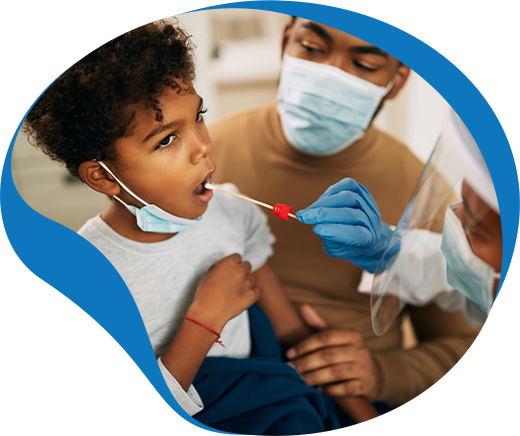
Secondary symptoms that indicate a moderate to severe case of COVID-19 in children include;
The same symptoms may appear in infants and toddlers when they are infected with the coronavirus. While children usually recover very quickly with no complications, it’s important that they can transmit the virus to other high-risk people. If you, as a parent, see any of the above-mentioned or flu-like symptoms in your child, get them tested for COVID-19 right away and take necessary precautions to stop the spread of the virus.
All children, regardless of their ethnicity and immigration status, deserve high-quality healthcare services, especially in the wake of a pandemic, such as COVID-19.
Although children are usually asymptomatic or show no symptoms at all when they contract the virus, it’s crucial to take precautionary measures in order to prevent the spread of virus to other people.
One of the most crucial ways to protect children from the COVID-19 pandemic is by ensuring they receive the vaccine when they become eligible.
In the United States, children aged 5 and above are now eligible to receive their COVID-19 vaccination.
However, the FDA has now permitted emergency use for Pfizer-BioNTech and Moderna vaccine for infants and toddlers from 6 months through 5 years old.
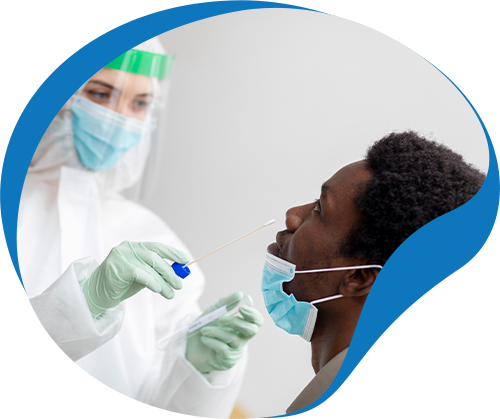
Transmission of COVID-19 to Children
Children mostly contract the virus from a parent or a caregiver who has been infected with COVID-19. If you’ve tested positive for COVID-19, you must isolate yourself from all family members including children.
If this is not possible, wear a mask at all times and especially when interacting with the children in your household.
COVID-19 is difficult to diagnose in children because most of the time there are very mild symptoms. However, even if your child shows cold-like symptoms, such as fever and cough, they must be quarantined at home to protect other people from getting the infection.
It is also recommended to get children who show cold-like symptoms tested for COVID-19 as soon as possible.
Some children also get a body rash as a result of contracting the coronavirus. People with viral infections often develop these symptoms, and it’s nothing to worry about. However, it’s important to know that when it happens because of COVID-19, it’s known as COVID-toe or COVID-fingers.
Symptoms of COVID-19 take about a week to 21 days to finally wear off in children. After three weeks, if your child still shows some symptoms as well as tiredness and fatigue, you should consult a physician right away.
Recent studies have provided evidence that unvaccinated children are at a higher risk of contracting the coronavirus than their vaccinated counterparts [2].
Children must receive their COVID-19 vaccination as soon as they are eligible in order to prevent COVID-related complications, including severe illness and hospitalization. It has been observed that vaccines are effective at protecting children against the virus. They not only reduce the severity of the disease, but also prevent the infection. Children with certain underlying medical conditions are at a higher risk of contracting COVID-19 and getting severely ill because of the infection.
These conditions include;
There is also strong evidence that suggests higher prevalence of COVID-19 in Hispanic and non-Hispanic Black children [9].
If you are among this population or your child belongs to the high-risk group, take extra precautions to protect yourself and your child from the complications of COVID-19. It is also recommended to get your child vaccinated as soon as they become eligible.
Transmission of COVID-19 by Children
Since it’s difficult to diagnose COVID-19 in children when there are no symptoms, this can put others around them at risk, including the elderly and other family members.
Pediatric patients infected with the coronavirus CAN transmit the virus to others, even if they are not exhibiting any symptoms.
Since the beginning of the pandemic, several studies have been conducted to study the rate of child-to-child and child-to-adult transmission of the disease. It was found that children transmit the virus at a lower rate to other children than to adults [6].
If a child has tested positive for COVID-19, it is necessary for them to remain quarantined for a period of 10 days, even if they do not exhibit any symptoms.
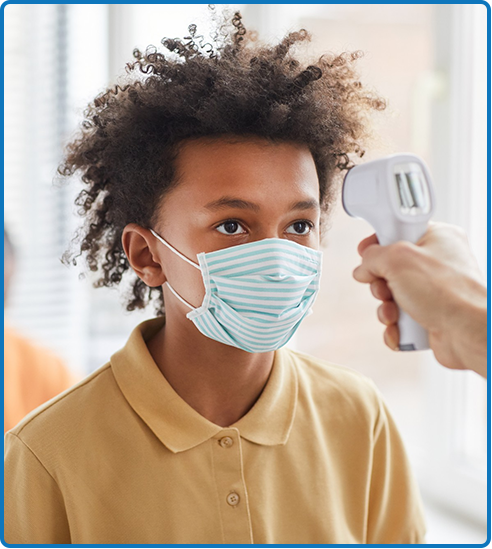
It is also important for children to take precautions such as wearing masks and practicing social distancing to prevent the spread of the virus.
Treatment of COVID-19 in Children
Since COVID-19 is a viral infection, doctors do not prescribe antibiotics for this illness. When kids get the infection, they are usually advised to;
Some children may be prescribed an antiviral drug or monoclonal antibodies for the treatment of COVID-19 [7].
If your child exhibits COVID-like symptoms like cough, trouble breathing, dizziness, rash, belly pain, and sore throat, consult your healthcare provider. They will be able to assess your child’s symptoms and provide proper guidance on whether the infection can be treated at home or requires hospital care.
Even after recovering from the disease, some children may still experience some side effects like fatigue, headache, trouble sleeping, and tiredness. Some people have reported symptoms like muscle and joint pain, prolonged cough, and trouble concentrating.
These symptoms are known as post-COVID-19 conditions [8] and they usually go away on their own. However, in order to help your child follow their school routine without disruption, you must talk to their teacher about these symptoms and what your child may need.
In any case, do NOT try to self-diagnose or self-treat COVID-19 as it’s a serious illness and requires proper testing, diagnosis, and treatment.
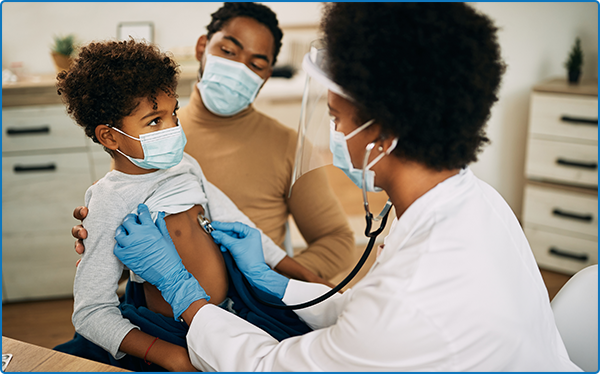
Multisystem Inflammatory Syndrome in Children
One of the complications of COVID-19 that may occur in pediatric patients is known as MIS-C or multisystem inflammatory syndrome in children.
The first case of MIS was detected in April 2020 [3]. In this condition, the infected child’s blood vessels, digestive system, eyes, and skin become swollen and irritated. It’s a rare condition, but if it occurs, the patient must be admitted to the hospital for proper treatment.
A child may also get these symptoms several weeks after they were infected with the virus. This condition can affect multiple organs simultaneously including vital organs like the heart, lungs, and kidneys.
If a child gets sick with MIS-C, they need immediate medical intervention, and in some cases may be admitted to the ICU for proper care and treatment.
If your child exhibits the following warning signs of MIS, seek medical help immediately;
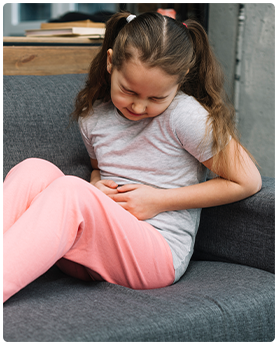
Severe stomach pain
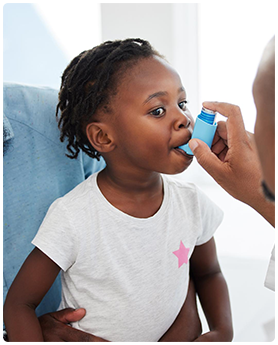
Breathing problems
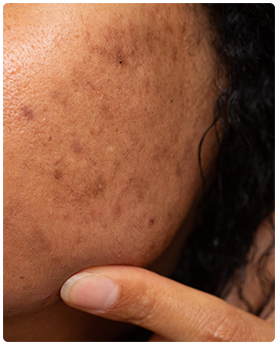
Bluish skin and nails

Inability to stay awake
The only way to prevent multisystem inflammatory syndrome is to get your child vaccinated as soon as he or she becomes eligible, as well as taking all the precautionary measures that help to contain the virus from spreading.
COVID-19 in Newborns and Babies
Studies have suggested that pregnant women can transmit COVID-19 to their babies, but these cases appear to be rare.
Infants may also contract the virus shortly after being born. Newborns infected with COVID-19 recover quickly with no or very mild symptoms and no serious complications.
However, it is still important for pregnant women to take precautionary measures to protect themselves from severe complications after COVID-19.
Pregnant women must also get vaccinated against COVID-19 as soon as possible to protect themselves and their babies from getting infected.
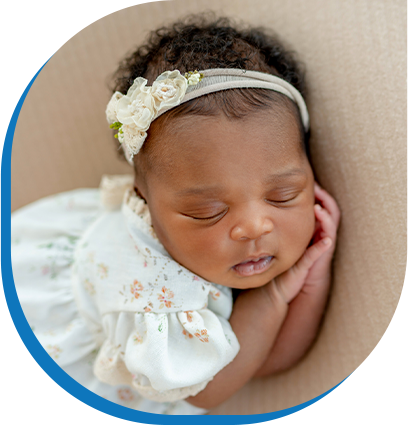
Research shows that infants under age 1 are more likely to get severely ill with COVID-19 than older kids [9].
If a newborn or infant has contracted the virus, it’s important to look for symptoms like difficulty breathing and blue skin around the lips or fingers. In addition, you should see a physician immediately if your baby is having difficulty drinking by mouth and is not peeing regularly.
These symptoms may develop into severe complications pretty quickly, so it’s important to get in touch with a healthcare provider right away.
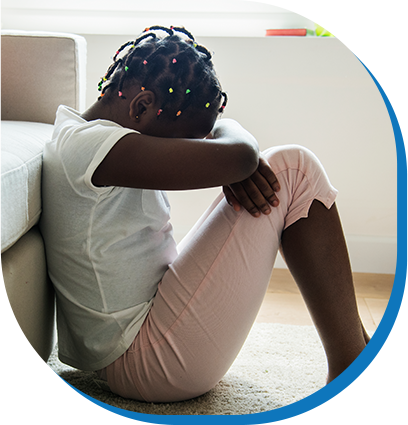
Behavioral Health Issues in Pediatrics After COVID-19
The isolation and uncertainty brought on by the pandemic have had a significant impact on children’s emotional well-being, and many are struggling with anxiety, depression, and other behavioral health conditions.
Since these health problems can affect a child’s academic performance as well as relationships and other areas of life, it’s important to recognize the symptoms early and seek appropriate help and support.
In children and adolescents, the most common behavioral health issues that have been observed after COVID-19 include;
These conditions have risen after COVID-19 not as a result of the illness, but mainly due to the sudden shift to online classes, social isolation, and the absence of extra-curricular activities among school-age children.
Since this change in routine has disrupted the stability and structure that children previously relied on, they are struggling with anxiety, depression, and other mental health issues.
*COVID-19 Vaccines for Children
In the United States, COVID-19 vaccines are now available for infants and children belonging to different age groups.
Previously, the FDA had not approved the use of COVID-19 vaccines for children below the age of 12. But now, the administration has given emergency-use authorization of a Pfizer-BioNTech as well as a Moderna vaccine for children from 6 months of age [8].
If your child belongs to the age group of 6 months to 5 years, you need to give them either Pfizer or Moderna vaccine. Pfizer for this age group requires three shots in total, the first two of which are given 3 to 8 weeks apart.
Moderna requires two shots with 4 to 8 weeks difference. Since both these vaccines contain lower amounts of mRNA than vaccines recommended for adults, they are safe for infants and toddlers.
The same vaccines have also been approved by the FDA for children from 5 to 11 years of age. Keep in mind that your child may show an immune response to the Moderna vaccine that has been recommended for this age group.
For children belonging to the age group of 12 to 17, the FDA has approved the vaccine known as Comirnaty, which is a variation of the Pfizer-BioNTech vaccine. This vaccine also requires three shots; the third booster is to be given two months after the second shot.
Research has proven that all these vaccines have been 91% effective in preventing severe illness due to COVID-19 in children [8].
The CDC has recently updated their COVID-19 vaccination guidelines for children aged 6 months to 5 years with weakened immune systems. The CDC recommends that this group of children receive an additional dose of the Moderna COVID-19 vaccine in order to provide greater protection against the virus.Similarly, children who belong to the age group 5 to 11 are required to get additional doses of the Pfizer-BioNTech COVID-19 vaccination if they have a compromised immune system.
